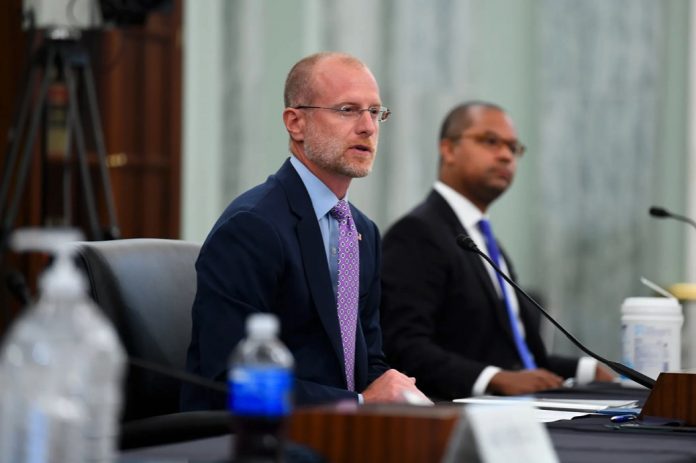โดนัลด์ ทรัมป์ ประธานาธิบดีที่ได้รับเลือกของสหรัฐฯ ได้แต่งตั้ง เบรนแดน คาร์ ให้ดำรงตำแหน่งประธานคณะกรรมการกลางกำกับดูแลกิจการสื่อสาร (FCC) คาร์ประกาศเป้าหมายของเขาทันทีว่า “เราต้องรื้อระบบการเซ็นเซอร์และคืนสิทธิ์ในการแสดงความคิดเห็นอย่างเสรีให้กับชาวอเมริกันทุกคน”
ข้อความดังกล่าวได้รับการสนับสนุนจากพันธมิตรคนสำคัญของทรัมป์อย่างอีลอน มัสก์ ซึ่งตอบกลับด้วยคำว่า “Based”
เบรนแดน คาร์ ผู้มีบทบาทสำคัญในโครงการ Project 2025 ของกลุ่มอนุรักษ์นิยม แสดงให้เห็นว่า FCC ในยุคของเขาจะไม่ดำเนินการแบบเดิมอีกต่อไป โดยเน้นการตรวจสอบบริษัทเทคโนโลยีเรื่อง “การเซ็นเซอร์” และการยุติโครงการส่งเสริมความหลากหลาย ความเท่าเทียม และการรวมกลุ่มในหน่วยงาน
คาร์ได้รับการแต่งตั้งให้เป็นกรรมาธิการ FCC ครั้งแรกในปี 2017 และกลายเป็นสมาชิกพรรครีพับลิกันอาวุโสในคณะกรรมการ นอกจากนี้ เขายังมีความสัมพันธ์ใกล้ชิดกับอีลอน มัสก์ และเคยวิจารณ์ว่าพรรคเดโมแครตใช้กฎหมายเพื่อกดดันบริการอินเทอร์เน็ตผ่านดาวเทียม Starlink
ในฐานะประธาน FCC คาร์อาจมีบทบาทสำคัญในการจัดสรรเงินอุดหนุนของรัฐบาลกลางให้กับ Starlink ซึ่งสื่อบางสำนักระบุว่าอาจเป็นเงินมูลค่าหลายพันล้านดอลลาร์
คาร์ยังวิพากษ์วิจารณ์แพลตฟอร์มเทคโนโลยีอย่าง Meta, Alphabet, Microsoft และ Apple โดยระบุว่าการดำเนินการของบริษัทเหล่านี้อาจเป็นการละเมิดสิทธิตามรัฐธรรมนูญของชาวอเมริกัน
อย่างไรก็ตาม FCC มีอำนาจจำกัดในการกำกับดูแลแพลตฟอร์มเทคโนโลยี และการเปลี่ยนแปลงในเรื่องนี้อาจต้องอาศัยการออกกฎหมายโดยสภาคองเกรส
นอกจากนี้ คาร์ยังสนับสนุนการยกเลิกกฎหมาย Net Neutrality และการแก้ไขมาตรา 230 ของกฎหมาย Communications Decency Act เพื่อจำกัดความคุ้มครองบริษัทเทคโนโลยีที่มีต่อการควบคุมเนื้อหา
สำหรับประเด็นด้านความมั่นคง คาร์ได้เรียกร้องให้มีการแบน TikTok โดยมองว่าเป็นภัยต่อความมั่นคงแห่งชาติ ซึ่งสะท้อนจุดยืนของทรัมป์ในช่วงที่ผ่านมา
แม้ว่าแนวทางของคาร์จะได้รับคำวิจารณ์อย่างหนักจากกลุ่มเรียกร้องสิทธิสื่อ แต่เขาได้รับการยกย่องจากบางฝ่าย โดย Gigi Sohn อดีตเจ้าหน้าที่ FCC กล่าวว่า คาร์เป็นผู้ที่มีความสามารถสูงและเหมาะสมกับตำแหน่ง
ในฐานะประธาน FCC คนใหม่ คาร์จะดำเนินตามเป้าหมายของทรัมป์อย่างเคร่งครัด ซึ่งแตกต่างจากอดีตประธาน Ajit Pai ที่มุ่งเน้นการลดช่องว่างทางดิจิทัล และ Jessica Rosenworcel ประธานคนปัจจุบันที่ให้ความสำคัญกับการเชื่อมโยงอินเทอร์เน็ตให้กับนักเรียนที่ขาดแคลนทรัพยากรทางการศึกษา
Brendan Carr wrote the FCC chapter in ‘Project 2025.’ Now he’s Trump’s pick for the agency

President-elect Donald Trump’s pick for chairman of the Federal Communications Commission, Brendan Carr, wasted no time in stating his priorities on Sunday night. Just one hour after thanking the president for the appointment, Carr wrote on X, “We must dismantle the censorship cartel and restore free speech rights for everyday Americans.”
Carr and Trump’s powerful ally Elon Musk immediately replied with one word of affirmation: “Based.”
The comments from Carr, who wrote the chapter on the FCC in the conservative blueprint Project 2025, signaled that it won’t be business-as-usual at the country’s communications regulatory agency. Past chairs of the agency, both Republicans and Democrats, have emphasized broadband internet deployment and wireless spectrum policy. Carr didn’t mention those issues on Sunday night.
Instead, he took aim at technology companies for “censorship;” promised to hold broadcast TV and radio stations accountable; and pledged to end the FCC’s promotion of diversity, equity, and inclusion efforts.
Carr was very clearly channeling the president-elect, who raised all three topics on the campaign trail, often in misleading ways.
Trump appointed Carr to the FCC in 2017. Carr is now the senior Republican at the agency, which meant he was widely expected to get the chairman appointment.
He also has a close relationship with Musk (some of it has been visible in their interactions on X) and has accused Democrats of waging “regulatory lawfare” against Musk’s Starlink satellite internet service.
As chairman, Carr may be able to steer generous federal subsidies to Starlink. When Politico published a story titled “the DC bureaucrat who could deliver billions to Elon Musk” last month, Carr told the outlet that he would be an even-handed regulator.
Musk celebrated Carr’s appointment on X on Sunday night. Both men talk in much the same way about free speech rights, reflecting widespread concerns on the right about online censorship. (Trump called Carr “a warrior for Free Speech” in the press release about his appointment.)
Claims of conservative censorship erupted several years ago as a result of content moderation decisions by social media platforms like Facebook and Twitter. Officials at the platforms said they were acting in good faith to reduce some of the toxicity – like election lies and Covid pandemic conspiracy theories – that turned off many users. Conservatives charged that the platforms were unfairly silencing their views – factoring into Musk’s decision to buy Twitter and turn it into X.
Carr advanced this belief in a recent letter to the CEOs of Meta, Alphabet, Microsoft, and Apple. He predicted that the Trump administration and Congress “will take broad ranging actions to restore” Americans’ First Amendment rights, “and those actions can include both a review of your companies’ activities as well as third-party organizations and groups that have acted to curtail those rights.”
The letter singled out NewsGuard, a startup that rates the reliability of news websites. NewsGuard said Carr was ill-informed: “Every statement in the letter about NewsGuard is false, citing unreliable sources.”
These battles are sure to continue once Carr becomes chairman, but they may be more in words than deeds. The FCC does not have any meaningful oversight of tech platforms like Google, and it would probably take an act of Congress to change that.
In his Project 2025 chapter, Carr laid out an agenda for the federal agency under a future Trump administration. The agency’s top priorities, he wrote, should be “reining in Big Tech, promoting national security, unleashing economic prosperity, and ensuring FCC accountability and good governance.”
In the chapter, Carr also asserted that the Chinese social media platform TikTok “poses a serious and unacceptable risk to America’s national security” and should be banned. Carr’s years-long crusade against TikTok paralleled Trump’s calls, although Trump reversed his position on TikTok earlier this year.
Carr has also supported the rollback of net neutrality rules and called for “legislation that scraps” Section 230 of the Communications Decency Act, which gives immunity to tech platforms that moderate user-generated content.
“Congress should do so by ensuring that Internet companies no longer have carte blanche to censor protected speech while maintaining their Section 230 protections,” he wrote in Project 2025.
The FCC does have jurisdiction over local TV and radio licenses. During his reelection campaign, Trump called for every major American TV news network to be punished, often because of interview questions he disliked or programming he detested. He repeatedly said that certain licenses should be revoked – usually while misstating how the licensing process actually works.
The FCC grants eight-year license terms and hasn’t denied any license renewal in decades. But Carr indicated earlier this month that he would take Trump’s complaints seriously. And he wrote on X Sunday night that “broadcast media have had the privilege of using a scarce and valuable public resource — our airwaves. In turn, they are required by law to operate in the public interest.” As chairman, he added, “the FCC will enforce this public interest obligation.”
Historically, the FCC has enforced this obligation by having stations file pro forma quarterly reports. Stations typically identify their local news coverage or public affairs programming.
The media reform group Free Press, which opposes Carr, said in a statement that “Carr doesn’t care about protecting the public interest; he got this job because he will carry out Trump and Musk’s personal vendettas.”
His appointment was met with praise by others, however. Gigi Sohn, a lawyer who worked for the FCC under Democratic chairman Tom Wheeler, wrote on X, “We may not agree on everything (or much of anything!), but he is highly qualified and a good guy.”
Most of all, he is aligning with Trump’s stated concerns. The FCC chairman during Trump’s first term in office, Ajit Pai, had a very different set of priorities. Upon departing the FCC, Pai cited accomplishments like “narrowing the digital divide” and “advancing American leadership in 5G.” Similarly, the current chair Jessica Rosenworcel, a Democrat, has emphasized what she called the “homework gap,” referring to students who can’t get online.
By Brian Stelter, CNN

















